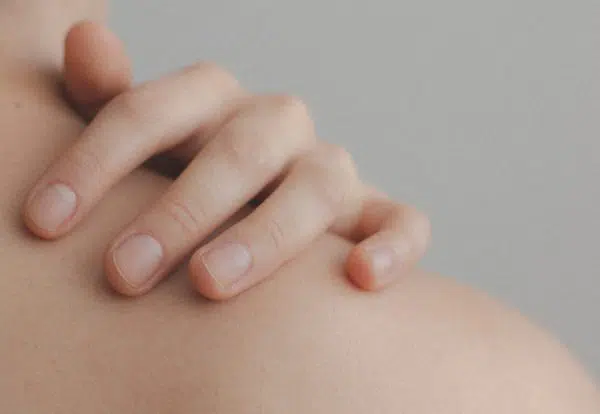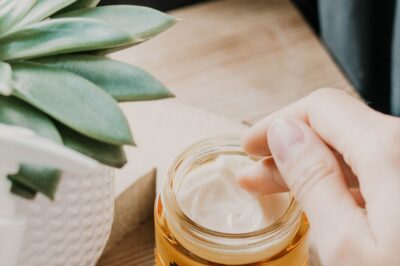Table of Contents[Hide][Show]
It’s not uncommon for one to associate flaky, itchy, lackluster complexion with the weather—especially if fine lines and wrinkles suddenly become more prominent. While Mother Nature can definitely play a role in the current condition of your skin, there are definitely other factors that can contribute to dehydration.
To be clear, dehydrated skin lacks water. Along with the weather, environmental factors (such as pollution), diet, caffeine, health issues, certain medications, and alcohol consumption are also surefire triggers—it’s also possible that you may simply not be drinking enough water.
So how do you know if you have dehydrated versus dry skin (yes, there is a difference) and what can you do about it? Read on to find out. By the time you’re finished with this post, you’ll have a better understanding of what condition you’re dealing with so that you can manage it by changing your lifestyle while adopting an effective skin care regimen.
Dry skin versus dehydrated skin
People often use the terms “dehydrated” and “dry” interchangeably, but they really are quite different despite the fact that you may exhibit some of the same symptoms—think of it like trying to decipher the distinction between a cold and allergies. If you’re a visual person, imagine the comparison between a grape and a raisin.
One is lacking water whereas the other is supple and plump. Your skin works the same way, but you must make sure it’s hydrated before you can add moisture. Our skin is comprised of 64 percent of water, so when it’s depleted, it’s going to show.
Moisture vs hydration
The hydrating properties in skin care products are formulated to increase the amount of water in your cells, which in turn promotes a healthy, smooth, and supple complexion. When we’re talking about moisture, however, think about the natural oils (sebum) in your skin that work to protect, nourish, and provide lubrication. It’s important to have a balance because if you want to prevent excessive dryness and premature aging.
One way to accomplish this feat is by following a diligent skin care routine that respects the science behind the steps. For example, you want to apply a lighter serum before a heavier moisturizer in an effort to lock in both hydration and moisture.
Dry skin
Dry skin lacks oil and is classified as a skin type that can be triggered by genetics, hormonal imbalances, or an underactive thyroid, all of which inhibit your skin’s sebum production. Statistics indicate that more than 50 percent of adults in the 40s-plus age range have dry skin, so you’re definitely more susceptible to being dry as you get older.
Unfortunately, dry skin cannot be reversed, but you can apply products comprised of nourishing plant oils such as coconut, almond, jojoba, argan, as well as essential oils—rose, lavender, frankincense, neroli, geranium, yarrow-pom are great for dry skin—to improve its appearance.
Signs of dry skin
- Flaking, scaling, or peeling
- Redness
- Itching
- Feeling of tightness—especially after contact with water
- Irritation
- Fine lines and/or cracks that may bleed
- Rough texture
Dehydrated skin
Unlike dry skin which is a skin type, dehydrated skin is a skin condition that can be controlled with diligence. Hormonal imbalances and the other aforementioned triggers have nothing to do with dehydrated skin.
However, it’s important to point out that even though changeable factors like diet and lifestyle can improve the appearance of dehydrated skin, it’s a bit more difficult to fight intrinsic aging—aka the natural aging process. Again, this is why you need to maintain a thorough skin care routine.
Signs of dehydrated skin
- Dull and feels tight
- Itchiness
- Dullness
- Darker under-eye circles
- Sunken eyes
- “Shadows” around the face (especially under the eyes and around your nose)
- Increased incidence or appearance of fine lines and surface wrinkles
Signs of severe skin dehydration
We know that we’re supposed to consume an average of eight cups of water per day, yet the average American adult only drinks a meager two and a half cups on a daily basis. So, it’s no surprise that 75 percent of adults suffer from chronic dehydration.
It takes only a two percent loss of total water content for your body to start feeling thirsty and at this point, your body is already dehydrated. Signs you’re severely dehydrated include:
- Dizziness
- Muscle cramps
- Headache
- Mood swings
- Dry mouth/bad breath
- Difficulty concentrating
- Fatigue
- Decreased cognitive ability
- Faintness
- Lightheadedness
- Overall weakness
- Urination that is darker and less frequent
Simple test to tell if you have dehydrated skin
While the list of symptoms is an irrefutable way to determine if you are severely dehydrated, you can also conduct a quick “pinch test.” Simply take a small portion of your skin around the cheek area and squeeze lightly—not too hard so you don’t cause bruising.
If you notice any wrinkling and if the skin doesn’t immediately bounce back after you let go, then your skin may be dehydrated. Medical professionals refer to the skin’s elasticity as the “skin turgor” when conducting such a test.
How to treat dehydrated skin
The good news is that dehydrated skin is relatively easy to treat providing you’re willing to make a few lifestyle changes. For example:
Drink plenty of water
While the “8×8” rule is relatively attainable easy to remember (8, 8-ounce glasses daily), The National Academies of Sciences, Engineering, and Medicine also suggests about 15.5 cups (3.7 liters) of fluids for men and 11.5 cups (2.7 liters) of fluids a day for women.
These recommendations include all fluids that come from water, beverages, and food—we typically get about 20 percent from eating alone. However, speak to your doctor or health care professional about what your target consumption should be. There are several health-related factors that could make a difference, so this is not a one-size-fits-all tip.
Drink alcohol in moderation only (if at all)
Moderate use equates to one drink a day for women of all ages and men older than 65 and up to two drinks a day for men 65 and below.
Drink less coffee
…and other sources of caffeine as they cause you to eliminate water faster.
Stop smoking
…as nicotine robs your skin of its water content. But that’s not all. It also contributes to sagging skin, psoriasis, acne inversa, vasculitis, telangiectasia, and more.
Stay hydrated during your workout
Drink water before, during, and after working out—the Nemours Foundation recommends taking a few sips every 20 minutes at minimum.
If exercise is intense and lasts more than an hour, opt for a sports drink that contains electrolytes as it can replace the minerals in your blood that vanished through sweating.
Get plenty of sleep
Advanced research suggests that lack of sleep can cause dehydration by upsetting the discharge of a hormone that’s crucial for regulating hydration.
Eat more plant-based foods
…such as fruits, vegetables, and legumes that possess a high water content. Don’t skimp out on the healthy fats (think olive oil, avocados) either. Essential fatty acids contribute to a hydrated, glowing complexion.

Use the correct skin care
Even if you’re cutting down on the booze, tweaking your diet, putting yourself on the patch, and getting enough shuteye, you still need to adopt—and stick to—a solid skin care routine. Sure, all of these good practices are as beneficial to your health as drinking enough water, but they are not enough.
Along with nourishing plant and essential oils, look for products that contain hyaluronic acid, aloe, and plant/flower extracts to provide moisture without excess weight. So, for example, you’ll want a moisturizer that hydrates your skin without being too heavy—that type of formula can actually make you break out without actually treating the problem at hand.
Even if you get regular facials (monthly, quarterly, etc.), it’s what you do on an accumulative basis that really counts.
Conclusion
Remember, dehydrated skin lacks water—not oil. The good news is that unlike dry skin that’s categorized as a challenging skin type driven by hormones and heredity, a dehydrated complexion is manageable because you only need to make lifestyle changes to improve it.
This includes skin care routine comprised of specific products designed to treat dehydrated skin. As we’re human, we’re losing water in a sweat session, not getting enough sleep, and yes, going out for Happy Hour with our colleagues. With that said, we could all use a hydration boost on a regular basis.
Annmarie’s Anti-Aging Facial Oil delivers intense moisture so that your skin looks supple and dewy, thanks to antioxidant-rich jojoba, chia, goji berry, and broccoli seed oils. Even those with oilier complexions can treat a dehydrated complexion with our Herbal Facial Oil for Oily Skin. Specially formulated with cleansing botanicals, white willow bark and neem, this fast-absorbing herbal blend helps unclog pores and balances natural oils
Sources
“The Water in You: Water and the Human Body,”
https://www.usgs.gov/special-topic/water-science-school/science/water-you-water-and-human-body?qt-science_center_objects=0#qt-science_center_object
https://www.mayoclinic.org/diseases-conditions/dry-skin/symptoms-causes/syc-20353885
“Best Oils for Dry Skin,” Intoxicated on Life,
https://www.intoxicatedonlife.com/best-essential-oils-for-dry-skin/
“Dry Skin: Seven Home Remedies,” Medical News Today, September 28, 2017,
https://www.medicalnewstoday.com/articles/319555.php
Mayo Clinic,
https://www.mayoclinic.org/diseases-conditions/dry-skin/symptoms-causes/syc-20353885
“The Top Three Causes of Dehydrated Skin,” April 25, 2019, The International Dermal Institute, https://www.dermalinstitute.com/article/18/
“Human Hydration Are we Drinking Enough?” WaterLogic,
https://www.waterlogic.com/en-us/resources/human-hydration-are-we-drinking-enough/
“Skin Turgor,” MedLinePlus,
https://medlineplus.gov/ency/article/003281.htm
“Nutrition and Healthy Eating,” Mayo Clinic,
https://www.mayoclinic.org/healthy-lifestyle/nutrition-and-healthy-eating/in-depth/water/art-20044256
“Sleep Deprivation May Cause Dehydration,” November 7, 2018, Medical News Today
https://www.medicalnewstoday.com/articles/323595.php
“9 Ways Smoking Damages Your Skin,” Very Well Mind, August 20, 2019, https://www.verywellmind.com/9-ways-smoking-damages-your-skin-4061299








Leave a Reply